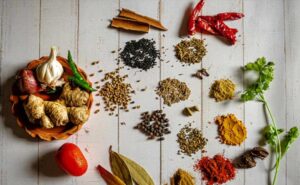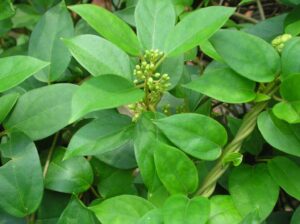In the quest to manage Type 2 diabetes, individuals and healthcare providers alike are continuously seeking effective and holistic approaches. Amidst the vast landscape of traditional medications and lifestyle modifications, herbal remedies emerge as a beacon of hope for many. This blog delves into the potential of various herbs for type 2 diabetes in supporting blood sugar regulation, enhancing insulin sensitivity, and fostering overall well-being.
Contents
9 Best Herbs For Type 2 Diabetes
 Managing Type 2 diabetes involves a comprehensive approach that includes lifestyle changes, medication, and sometimes, natural supplements or herbs. Many people find herbs to be beneficial due to their potential to improve insulin sensitivity, lower blood sugar levels, and reduce the risk of diabetes-related complications. Here’s a list of ten herbs for type 2 diabetes:
Managing Type 2 diabetes involves a comprehensive approach that includes lifestyle changes, medication, and sometimes, natural supplements or herbs. Many people find herbs to be beneficial due to their potential to improve insulin sensitivity, lower blood sugar levels, and reduce the risk of diabetes-related complications. Here’s a list of ten herbs for type 2 diabetes:
Cinnamon
Cinnamon, a spice derived from the bark of trees in the Cinnamomum family, is celebrated not just for its aromatic addition to culinary delights but also for its potential health benefits. For individuals with Type 2 diabetes, cinnamon has been studied for its ability to improve blood glucose control. It’s believed that compounds in cinnamon can mimic insulin, facilitating the uptake of glucose into cells and thus lowering blood sugar levels. Moreover, cinnamon may enhance insulin sensitivity, making the body’s insulin more effective.
Fenugreek
Fenugreek, with its cuboid-shaped, yellow-to-amber colored seeds, is not only a staple in culinary traditions around the world but also a herb with a long history in medicinal use, particularly in Ayurveda. Rich in soluble fiber, fenugreek seeds can slow down the absorption of carbohydrates. And, leading to a more gradual rise in blood sugar levels post-meal. Additionally, the seeds contain compounds that may stimulate insulin secretion and improve insulin sensitivity. Consuming fenugreek in various forms, such as seeds, powder, or as part of a meal, can be beneficial.
Bitter Melon
Bitter melon, also known as bitter gourd or Momordica charantia, is a tropical and subtropical vine fruit with a distinctive warty appearance and a taste that lives up to its name. It’s long been utilized in traditional medicine across various cultures for its antidiabetic properties. Bitter melon contains at least three active substances with anti-diabetic effects, including charantin. It has been shown to have a blood glucose-lowering effect, vicine, and an insulin-like compound known as polypeptide-p.
Gymnema Sylvestre
 Gymnema Sylvestre, often hailed as the “sugar destroyer,” is a woody climbing shrub native to India and Africa. It’s been used for centuries in Ayurvedic medicine to help control diabetes and manage sugar cravings. The herb contains gymnemic acids, which have been shown to decrease the absorption of sugar from the intestine and boost insulin production and release. This dual action not only helps lower blood sugar levels but also aids in reducing the taste of sugar in the mouth. It can help curb sugar cravings.
Gymnema Sylvestre, often hailed as the “sugar destroyer,” is a woody climbing shrub native to India and Africa. It’s been used for centuries in Ayurvedic medicine to help control diabetes and manage sugar cravings. The herb contains gymnemic acids, which have been shown to decrease the absorption of sugar from the intestine and boost insulin production and release. This dual action not only helps lower blood sugar levels but also aids in reducing the taste of sugar in the mouth. It can help curb sugar cravings.
Berberine
This is a compound extracted from several different plants, including a group known as Berberis. Traditionally used in Chinese medicine, berberine has gained prominence for its potential in managing Type 2 diabetes. It’s believed to act in multiple ways: enhancing insulin sensitivity, increasing glycolysis (the breakdown of glucose within cells), decreasing sugar production in the liver, and slowing the breakdown of carbohydrates in the gut. Berberine has been compared to some diabetes medications in its efficacy in lowering blood sugar levels.
Aloe Vera
Aloe vera is widely recognized for its soothing properties on burns and wounds, but this succulent plant also holds potential benefits for blood sugar regulation. The clear gel extracted from the plant’s leaves is rich in phytosterols that have antihyperglycemic properties. And, making it beneficial for people with Type 2 diabetes. Studies suggest that aloe vera can help improve blood glucose levels and may also have a positive effect on lipid profiles, reducing cholesterol and triglycerides.
Turmeric
Turmeric, a bright yellow spice derived from the root of the Curcuma longa plant, is a cornerstone of traditional Indian medicine and cuisine. It contains curcumin, a compound with powerful anti-inflammatory and antioxidant properties. For individuals with Type 2 diabetes, turmeric may offer several benefits, including enhancing insulin sensitivity and reducing inflammation. Curcumin has also been shown to decrease the level of glucose in the blood and help mitigate some of the complications associated with diabetes, such as neuropathy and retinopathy.
Bilberry
Bilberry, closely related to the blueberry, contains high levels of anthocyanins, antioxidants that give the fruit its deep blue color. These compounds are of particular interest for diabetes management due to their potential to improve insulin sensitivity and help protect against insulin resistance—a key factor in Type 2 diabetes. Additionally, bilberries are believed to aid in the protection of the eyes and reduce the risk of diabetic retinopathy, a common complication of the disease.
Okra
Okra, also known as “lady’s finger,” is a vegetable commonly used in dishes around the world and is renowned for its health benefits. It contains a unique substance called mucilage, which can help stabilize blood sugar levels by slowing down the digestion of carbohydrates. Research has indicated that the soluble fiber in okra helps to lower blood sugar by regulating the rate at which sugar is absorbed from the intestinal tract. This can be included in the diet in various forms, such as fresh, dried, or powdered, and even okra water (soaking okra pods in water overnight and drinking the water).
While these herbs and plants offer promising benefits for individuals managing Type 2 diabetes, it’s essential to approach their use with care. Always discuss with a healthcare provider before integrating any new herbal remedies into your diabetes management plan. This will help to ensure they are appropriate for your individual health needs and won’t interact with other medications you may be taking.
Considerations While Taking Herbs For Type 2 Diabetes
 When incorporating herbs for type 2 diabetes into the management plan, it’s crucial to proceed with informed caution. Herbs can offer significant benefits, but they also come with potential risks and considerations. Here are key points to keep in mind:
When incorporating herbs for type 2 diabetes into the management plan, it’s crucial to proceed with informed caution. Herbs can offer significant benefits, but they also come with potential risks and considerations. Here are key points to keep in mind:
Understanding Potential Interactions
Some herbs can interact with diabetes medications, leading to hypoglycemia (abnormally low blood sugar levels) or other unwanted effects. For instance, herbs like cinnamon and fenugreek may enhance the blood sugar-lowering effects of traditional medications, requiring adjustments to dosages.
Quality and Purity of Herbal Supplements
The supplement market is not as tightly regulated as pharmaceuticals, leading to potential variations in the quality, purity, and strength of herbal products. Opt for supplements from reputable sources that provide third-party testing and verification of their products.
Recognizing Side Effects
While herbs are natural, they can still cause side effects or allergic reactions in some individuals. It’s important to start with lower doses and pay attention to your body’s response. Common side effects may include gastrointestinal upset, headaches, or allergic reactions.
Dosage and Administration
The effective dose can vary widely between individuals and the specific herb in question. Follow the recommended dosages on supplement labels or those provided by a healthcare professional. Be wary of exceeding recommended doses, as more is not always better and can sometimes lead to serious health issues.
Monitoring Blood Sugar Levels Closely
When adding herbs to your diabetes management plan, it’s crucial to monitor your blood sugar levels closely. Some herbs can significantly affect blood sugar levels, requiring adjustments to your medication or dietary plan to avoid hypoglycemia or hyperglycemia.
Long-term Effects and Research
The long-term effects of many herbal supplements on diabetes management are still being researched. Stay informed about the latest findings and be open to adjusting your approach based on new evidence or recommendations from your healthcare provider.
Incorporating herbs into your diabetes care plan can be a beneficial adjunct to traditional treatments. But it requires a careful, informed approach. By staying informed and working closely with healthcare professionals, you can safely explore the potential benefits of herbs while minimizing risks.
Conclusion
In conclusion, herbs for type 2 diabetes offer a promising addition to traditional management, potentially aiding in blood sugar control, insulin sensitivity, and overall well-being. However, it’s crucial to approach their use with care, prioritizing consultation with healthcare professionals, understanding possible interactions with medications, and monitoring for any side effects.
By integrating herbs as a complementary treatment—alongside a balanced diet, regular exercise, and prescribed medications—individuals can harness the natural world’s benefits. Do you want to get rid of diabetes? Join our online diabetes treatment program and reverse Diabetes naturally through lifestyle changes such as a Personalized Diet plan, Exercise, Yoga, dieticians, and health coaches.

